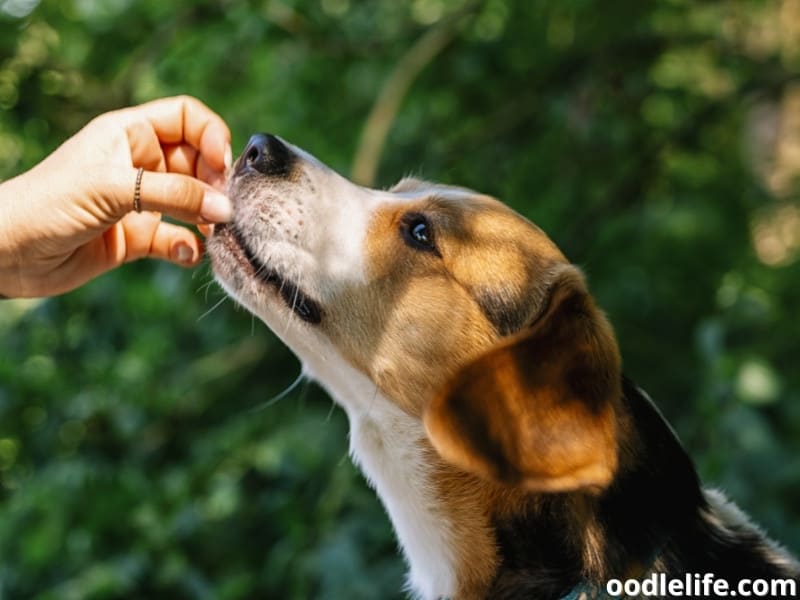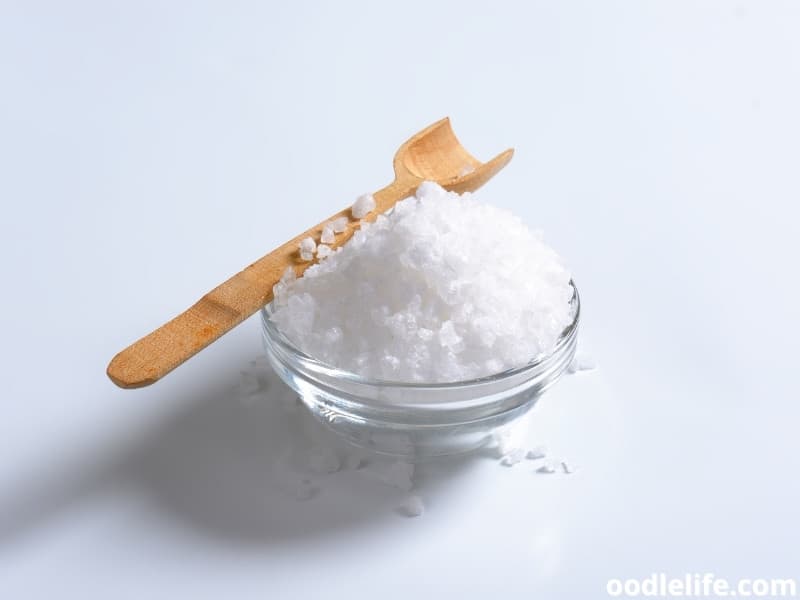Can Dogs Eat Salt and Vinegar Chips?
While I love treating my dogs to their favorite table scraps, I want to be sure that what they’re eating is healthy.
Most of us are aware that chips aren’t the healthiest snacks. Even for humans, they contain harmful trans fats, high sodium levels, and minimal healthy nutrients. Like us, dogs should eat potato chips in moderation.
While one or two chips every once and a while won’t hurt, though, an excess may lead to health issues down the line.
Potato chips get fried in oils containing trans fats, which can cause obesity, diabetes, and cardiovascular disease in your pet. What’s more, feeding your dog potato chips will fill their belly without adding any nutritional value. A diet high in unhealthy carbs can eventually lead to serious nutrient deficiencies.
If you’re eating salt and vinegar chips, only feed them to your dog in small, infrequent amounts. You should also dispose of the bag somewhere to ensure your dog can’t get to it. Not only can they lick unhealthy salt and spices from the lining, but bags may pose a suffocation risk for smaller pets.

In most cases, cooked potatoes are perfectly safe for dogs. They contain healthy nutrients such as vitamin C, potassium, and magnesium. In fact, many popular brands of dog foods use potatoes as a filler for kibble.
On the other hand, fried potatoes such as chips are not healthy. They are fried in oil containing unhealthy trans fats, which may put your pup at a higher risk of elevated cholesterol. While fried potatoes are not toxic for dogs, you should only offer them in moderation.
Never feed your dog green or raw potatoes, as these can be deadly. As a member of the nightshade family, they contain the poison solanine. In high enough concentrations, it can lead to issues ranging from digestive problems to paralysis and death.

Salty chips contain high sodium levels, which can be unhealthy or even deadly for your dog.
A small amount of salt is unlikely to cause much harm, though it may lead to discomfort. Salt is even necessary to maintain healthy function in small amounts. Experts recommend dry food for dogs should contain at least 0.3% sodium per volume.
However, overly salty snacks can make dogs feel dehydrated. If you feed your dog even a small amount of chips, make sure you have plenty of water on hand in case they get thirsty.
Larger amounts of salt can lead to more serious short-term issues. It may cause digestive problems such as nausea, vomiting, and diarrhea. If your dog drinks more to cope with dehydration, you may notice excessive urination.
Regular salt consumption may result in long-term health problems for your pooch. Too much salt can lead to kidney damage, cardiovascular disease, and even salt poisoning. If you notice symptoms such as lethargy, depression, shortness of breath, or seizures, contact your vet straight away.

Like salt, vinegar is fine for most dogs in small amounts. How well a dog tolerates vinegar can vary greatly between individuals and species.
For most dogs, the amount of vinegar found on a salt and vinegar chip is not enough to cause damage. In large volumes, however, vinegar may lead to gastrointestinal issues. Issues can range from nausea and vomiting to gas, diarrhea, and inflammation.
Dogs with sensitive stomachs or kidney disease may have more trouble processing vinegar than others. Some may even be allergic to vinegar. In these cases, ingestion can lead to issues such as itching, rashes, and even difficulty breathing.
If you’re not sure whether your dog is allergic to vinegar, a simple test will tell you if it’s safe. You can add a very small spoonful of vinegar to its regular food to see how it reacts. It’s best to use apple cider vinegar, as it’s gentler on the stomach than other types.
If your dog shows signs of discomfort after eating, such as gas or vomiting, vinegar likely doesn’t agree with their system. On the other hand, if your dog shows no change, they’re probably okay to eat salt and vinegar chips in moderation.
When in doubt, always speak to your vet before adding anything new to your dog’s diet. They can help you to come up with a safe and healthy meal plan, including appropriate snack options if necessary.

If your dog loves potato chips, you could try making your own as a healthier alternative to salt and vineger chips. Use regular potatoes and bake them without any salt and seasoning. Just make sure these home-made potato chips are served in moderation and your dog should be fine.
Aside from salt and vinegar chips, there are several other foods that dogs shouldn’t eat. You can learn more by checking our list of 100+ human foods that are and aren’t safe for dogs to consume.
Dogs shouldn’t eat salt and vinegar chips. These potato chips typically contain ingredients that are harmful for dogs especially if the chips are ingested in large amounts. Generally speaking, dogs don’t respond well to high sodium and vinegar content. It can cause issues with their stomachs and other parts of the gastrointestinal tract.
Salt and vinegar chips may also contain artificial additives that can increase the likelihood of a dog developing symptoms like stomach upsets, vomiting, and diarrhea. Your dog might be begging you to get a taste of the salt and vinegar chips but he just doesn’t know any better. Keep the chips away from your dog and offer him a healthier dog treat alternative like cooked lean meat, mashed pumpkin, or fresh vegetables.
CAN DOGS EAT CHEESE AND ONION CRISPS?
If your pooch manages to snuffle a crisp they should be okay, but they definitely shouldn’t eat cheese and onion crisps regularly. Onion is toxic to dogs, and although the amount in a packet of crisps isn’t enough to poison your pup, eating a little onion or garlic regularly can lead to problems even if it’s in powdered form like the flavours found on crisps.
Can Dogs Eat Salt and Vinegar Chips?
In this brief guide, we will answer the query, “Can dogs eat salt and vinegar chips?” and will discuss how salt and vinegar chips are not good for dogs to consume.